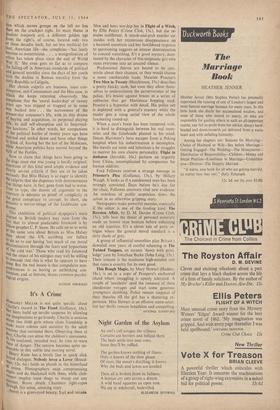It's A Crime
Charlie's MILLAR is not quite specific about `-hharlie's record in The Fiend (Gollancz, 16s.). Cr hints build up terrific suspense by allowing °,,ur imaginations to go broody. Charlie is anxious "out two little girls whose close friendship is made more solemn and secretive by the adult tensions that surround them. Observing them at tpaY, Charlie can sense the children's uneasiness. 11 his confused, retarded way, he tries to warn ,2eril of danger. The tension becomes quite un- bearable in this subtle and moving novel. Henry Kane has a lovely line in quick slick hYlical dialogue. Nobody loves a Lover (Board- ",,1,411, 1/s. 6d.) lands us plumb in the hinterland avi crime. Photographers snap compromising nligles and do blackmail with them, while club- owners employ tame thugs to stamp out any ustlernies. Brave sleuth Chambers tight-ropes "rough this tense, amusing story.
Annet is a great-eyed beauty, frail and remote.
Men and boys worship her in Flight of a Witch, by Ellis Peters (Crime Club, 15s.), but she re- mains indifferent. A smash-and-grab murder co- incides with her mysterious disappearance on a haunted mountain and her bewildered response to questioning suggests an intense determination to conceal something. It's a good mystery, dom- inated by the character of this enigmatic girl who stuns everyone into an amazed silence.
Professional thieves are bound to be opti- mistic about their chances, or they would choose a more comfortable trade. Maurice Proctor's Two Men in Twenty (Hutchinson, 15s.) describes a pretty finicky mob, but even they allow them- selves to underestimate the perserverance of the police. It's brains against brains in a series of robberies that get Martineau hopping mad. Proctor's a hypnotist with detail. His police net is deployed with a general's mastery while the reader gets a smug aerial view of the whole fascinating round-up.
When a man's brain has been tampered with, it is hard to distinguish between his real mem- ories and the falsehoods planted in his mind. Simon Harvester's hero escapes from a Peking hospital when his indoctrination is incomplete. His travels are tense and laborious a he struggles to recover his own elusive personality. Flight in darkness (Jarrolds, 16s.) pictures an urgently busy China, uncomplicated by compassion for human oddities.
Fred Fellowes receives a strange message in Prisoner's Plea (Gollancz, 15s.), 'by Hillary Waugh. It looks as if a condemned man has been wrongly convicted. Days before he's due for the chair, Fellowes uncovers vital new evidence. An overdose of public scepticism slows the action in an otherwise gripping story.
Newspapers make powerful enemies,. especially if the editor is one of the feuding kind. The Royston Affair, by D. M. Devine (Crime Club, 15s.), tells how the threat of personal notoriety made an honest man hesitate before exhuming an old injustice. It's a clever tale of petty in- trigue where the general moral standard is a dirty shade of grey.
A group of influential smoothies plan Britain's downfall over years of careful scheming in The Twisted Tongues, an earnest 'down with privi- ledge' yarn by Jonathan Burke (John Long, 15s.). Their treason is the insiduous high-minded sort that ruins a country for its own good.
This Rough Magic, by Mary Stewart (Hodder, 18s.), is set in a copy of Prospero's enchanted island where smuggling is openly tolerated. A couple of 'accidents' spoil the romance of these clandestine voyages and start some generous youngsters sleuthing. Police remain sceptical of their theories till the girl has a shattering ex- perience. Miss Stewart is an effusive scene-setter, but her thrills remain breathless and compelling.
ANTONIA SANDFORD






























 Previous page
Previous page